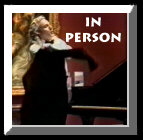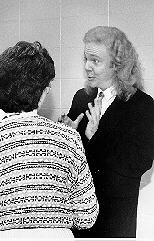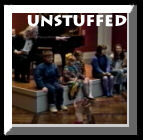
 |
There seem to be two kinds of artists one encounters at a classical piano recital: The anguished
soul who permits the audience to watch as he is tortured by the music... introverted, sweaty and
pained, he finishes his piece beaten, bedraggled, a self-proclaimed martyr to the muse... Or, the
extrovert, cocky and arrogant - the intent of his performance to instruct plebeians, scandalize the
cognoscenti and declare once and for all the only right way to play.
Probably the most startling thing about pianist, Christopher Finkelmeyer is that he is neither of
these. A look at his history reveals why.
 While his pianistic life follows the classic form: child prodigy, honors, awards, prominent
teachers, educated abroad... his background: small Wisconsin town, captain of the basketball
team, middle son of 5 boys, Father a barber, Mother a homemaker, would seem more likely that
of a carpenter than a world-class pianist.
While his pianistic life follows the classic form: child prodigy, honors, awards, prominent
teachers, educated abroad... his background: small Wisconsin town, captain of the basketball
team, middle son of 5 boys, Father a barber, Mother a homemaker, would seem more likely that
of a carpenter than a world-class pianist.
And yet, this very simplicity is at the heart of his artistry. Honest, intelligent, intuitive, his
playing is, at once, forthright and refined. "Finkelmeyer not only has an outstanding technique,
but his playing is virtually without idiosyncrasy, a well-blended amalgam of styles that can only
be described as American." (Times Argus, Vermont)
 His character follows suit. Warm and genial, his down-to-earth manner and quick sense of
humor draw the audience in, and keep them there until the last note is played. Says he "It's not
enough for me to respect the music. Respecting the audience is as important. There was a time I
didn't love classical music as I do now. I almost hated it. I didn't respect classical musicians
and was most definitely bored by them. I'll never forget there are others at this moment who feel
just as I did."
His character follows suit. Warm and genial, his down-to-earth manner and quick sense of
humor draw the audience in, and keep them there until the last note is played. Says he "It's not
enough for me to respect the music. Respecting the audience is as important. There was a time I
didn't love classical music as I do now. I almost hated it. I didn't respect classical musicians
and was most definitely bored by them. I'll never forget there are others at this moment who feel
just as I did."
While critics tout him "a virtuoso of both technical and emotional power", his audiences speak
of exciting, moving programs which they understand and thoroughly enjoy.
 Serious music has comprised most of Finkelmeyer's Carnegie Recital Hall concerts, but he
always looks forward to engagements such as the Arizona Sundome where transcriptions on
contemporary music and novelty pieces can be included in his programming. He believes very strongly that each program should be especially selected for the audience according to when and
where it will be heard, and looks forward to special considerations such as Children's
Programming, "All American Recitals" and others.
Serious music has comprised most of Finkelmeyer's Carnegie Recital Hall concerts, but he
always looks forward to engagements such as the Arizona Sundome where transcriptions on
contemporary music and novelty pieces can be included in his programming. He believes very strongly that each program should be especially selected for the audience according to when and
where it will be heard, and looks forward to special considerations such as Children's
Programming, "All American Recitals" and others.
Although his previous residences have included New York City, where he studied at the Juilliard
School and Vienna, Austria, where he studied under Paul Badura-Skoda at the Hochschule für
Musik, when it came time last July, to "put down roots" and buy a home, he came back to
Chicago, the city he learned to love while completing his undergraduate work at Northwestern
University under Donald Isaak.
Now that he's settled in his new home, he plans to complete work on a serious music video and "watch a lot of football."
 |  |